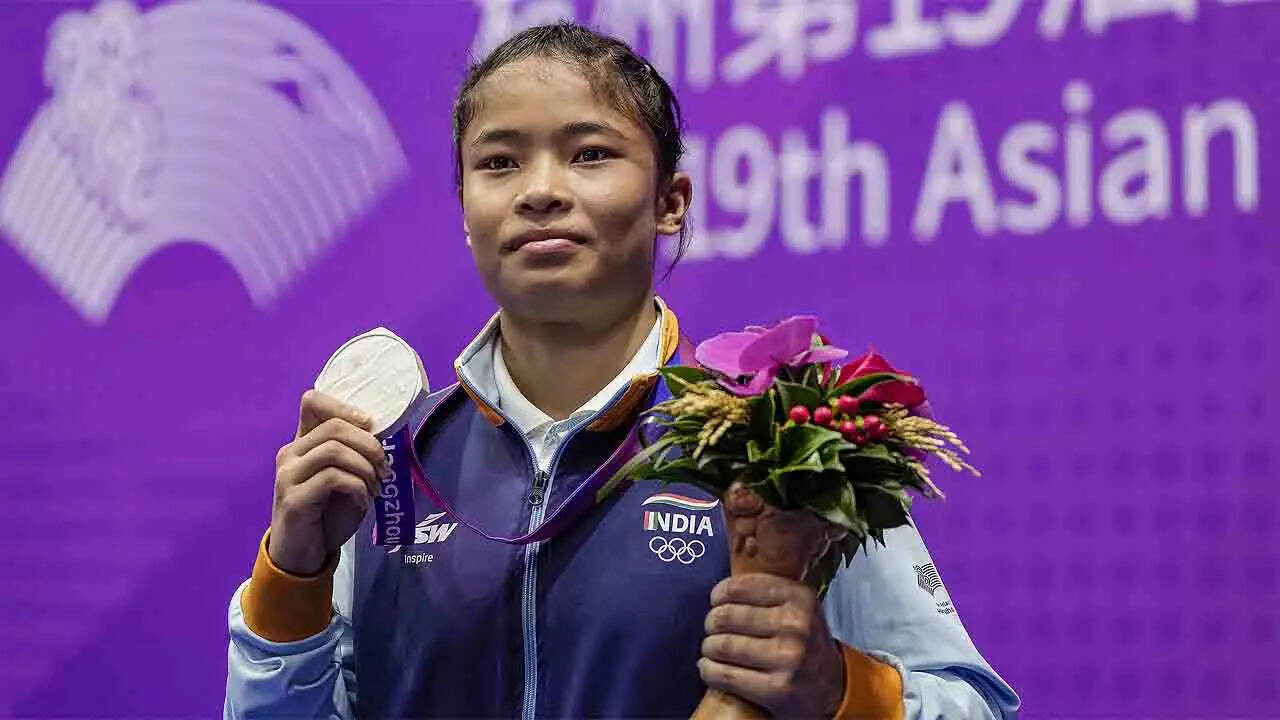
HANGZHOU: You can block out the noise, modern society and technology is all about cancellation. We have mastered the science of blocking out external noise, but how do you block out the voices in your head, that strange mix of elation and anxiety, fear and euphoria? Have they devised an app for that yet? The sinking in the stomach after the soar of the heart. This is not about victory or defeat, those two impostors, or gold or silver. This is about life, physical safety, death even.
Naorem Roshibina Devi endured those conflicting emotions on Thursday. Was she as happy to end India’s 13-year-long wait for a silver medal from the wushu arena or did the worry lines furrowed on her forehead tell of another feeling.
Roshibina changed the colour of her medal from bronze in Jakarta 2018 to silver in Hangzhou, after securing an impressive second-place finish in the final of the women’s 60kg sanda event, going down to local favourite and reigning champion, Wu Xiaowei.
In another time, in another world, this would have been sporting perfection, plain and simple. No question. But when she broke down, the tears flowing freely, it was disturbing to watch. She had bottled them up quite well for quite some time now. On Wednesday, a weight was being lifted.
Fresh violence had again broken out in her state of Manipur on Wednesday. And India’s latest silver medallist said that she feared for the life of her parents and siblings following police action against students in Imphal during a demonstration march protesting the alleged kidnapping and death of two local youths. More than 180 people have been killed and several hundred injured since ethnic violence broke out in Manipur on May 3.
In a sense, it was callous of us to want Roshibina to fight, much less win us a fine silver. But maybe that was the distraction she herself badly needed, an antidote, anything that could calm her nerves. But you needed great courage or supreme indifference to ask her that. “I play for India and I request for help to bring Manipur to normalcy,” she said, “Manipur is burning. Fighting is going on in Manipur. I can’t go to my village.” Roshibina last met her father in June at the Imphal SAI Centre, she has been advised not to visit home.
“I want to dedicate this medal to my people in Manipur and to my community protecting and fighting for us. A lot of infighting is going on there which is not good. I request everyone to stop violence and return to their normal lives. I feel bad that I am not able to go there and help,” said Roshibina braving through her tears.
She spoke to her parents on Wednesday and they asked her to focus on the final without getting distracted by the violence.
Her coaches had managed to keep her mind off the situation at home in the run up to Hangzhou, confiscating her phone and allowing her to call home only on weekends. But these things have a way of creeping in.
Roshibina said she was able to speak to her parents – father Naorem Dhamu and mother Romila Devi – a night before her final.
“I did speak to them last night and they wished me luck. I know the mobile internet services are suspended, so I can’t make a video call to them. My parents are doing fine but still there’s this fear of what will happen next to us. Abhi poora log dar ke baitha hua hai (We are all very afraid). I hope things go back to normal so that I can visit them soon. My parents don’t let me come home and I am forced to live in the SAI hostel in Imphal. They think it’s better for me to stay there, far from violence,” she sighed.
On the mat, the 23-year-old from the Kwasiphai Mayai Leikai village in Manipur’s Bishnupur district lost 0-2 to Wu after putting up a spirited fight. The Indian had her moments to make a rally but the Chinese proved too strong an opponent to allow Roshibina any leeway, pushing her off the mat and going for takedowns. Wu led the first period 1-0 and, in the second, got hold of her torso for another takedown to be declared winner by points.
“Next time, I will definitely bring the gold for India. But I am happy with my overall performance. I was able to change the colour of my medal. Of course, the target was gold but this medal is no less significant. Mistakes do happen, so I’ll try to learn from them and give my best the next time,” she said.
Before Roshibina, fellow Manipuri Wangkhem Sandhyarani Devi had made the wushu final at the 2010 Guangzhou Asian Games. India had nine Asiad medals in wushu (one silver, eight bronze) before Roshibina’s second-place finish.







